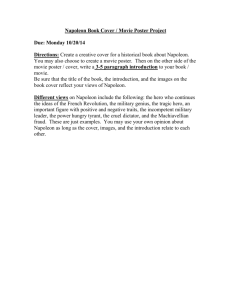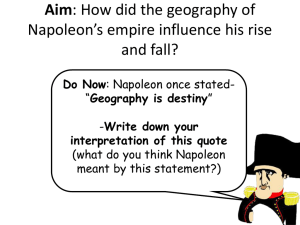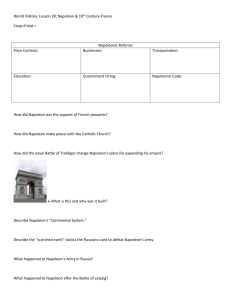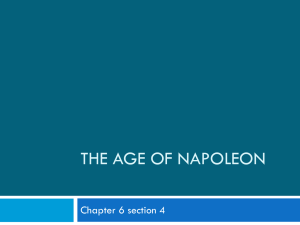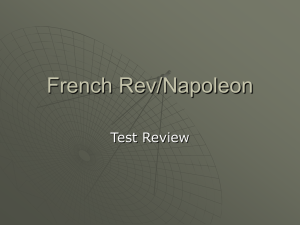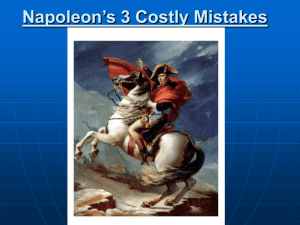Napoleon - Wilson School District
advertisement
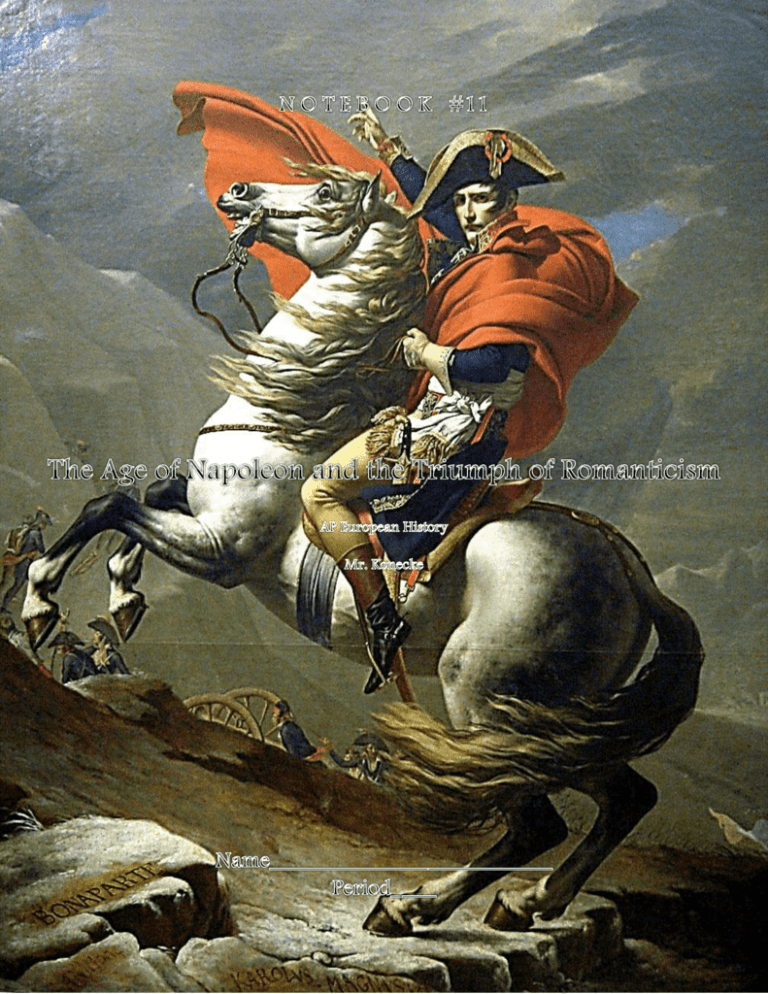
1 Project #11 – Napoleon: Hero or Tyrant? Introduction: Many have praised Napoleon as a brilliant leader, a talented lawmaker, and a military genius. Others have argued that he was a tyrant, a dictator, and only concerned with his own power and glory. As a result, there are thousands upon thousands of books, articles, diary entries, paintings, and so on about Napoleon, all presenting him in a different light. Your job will be to decide how you see him – a hero, a tyrant, or something else entirely. Directions: 1. First, you must conduct some more research about Napoleon and his strengths and weaknesses to get a better understanding of the man. 2. Then you must decide what, in your opinion, stands out most about Napoleon. 3. Then you will use one word to describe him and place that title somewhere on your portrait. 4. You must then create a portrait of Napoleon as you see him (in other words, the title of your portrait should match how you present him). 5. On the back of your portrait, explain your opinion of Napoleon (at least 10 sentences) Options: 1. You may create your portrait in any way that you like (pencil, marker, crayon, paint, clay, cement, computer, etc.). 2. You may use any word to describe him that you want (school appropriate). Grade: 1. One word title of your portrait that sums up your opinion of Napoleon – 25 points 2. Detailed, complete, original portrait of Napoleon that clearly illustrates your opinion of him – 100 points 3. 10 sentences on the back clearly explaining your opinion of Napoleon – 50 points 4. Your portrait demonstrates significant effort and an attempt at creativity – 25 points Due Date: ______________________________________________ NOTEBOOK #11: THE AGE OF NAPOLEON AND THE TRIUMPH OF ROMANTICISM 1. The Rise of Napoleon Bonaparte Napoleon o Many émigrés returned to France – supported by devout Catholics & citizens tired of revolution o Elections of 1797 put many constitutional monarchists into legislature (majority) o Put own supporters in legislature, imposed censorship, & exiled some enemies o 2 As in 1795, Napoleon had saved the day for the government Napoleon Bonaparte was born 1769 to poor family of lesser nobles in Corsica o France had annexed Corsica 1768, so Napoleon went to French schools o o He favored the revolution & was a radical Jacobin o 1793, he helped recover port of Toulon from British – o During Thermidorian Reaction, his defense of new regime won him command in Italy Early Military Victories 1795, French army & politics had destroyed First Coalition o Invasion of Italy meant to take Austria’s Italian province of Lombardy (wealthy) With series of quick victories, Napoleon crushed Austrian & Sardinian armies 1797, Napoleon returned to France a hero – o He believed it was impossible to invade England at the time o Instead, he decided to attack British interests in Mediterranean by capturing Egypt Soon, France dominated all of Italy & Switzerland Trying to draw British fleet away from Mediterranean, cut off their communications with India, hurt British trade, and threaten the British Empire Napoleon easily overran Egypt – but invasion was failure o Europe’s leaders began to worry about France o 3 1799, Russians & Austrians defeated French in Italy & Switzerland & threatened to invade France o This would convince Ottoman Empire to reform if it was going to resist other invaders The Constitution of the Year VIII Economic problems eroded Directory’s support o Author of What is the Third Estate? – wanted executive body independent of electoral politics When Napoleon heard, he (without orders) left his army in Egypt & returned to France o He joined Sieyes & his troops guaranteed success of the coup Sieyes thought he could use Napoleon & then get rid of him – wrong o Proposed constitution divided authority among three consuls Appeared to champion democratic principles and checks & balances THE RISE OF NAPOLEON Directions: After reading the background information about Napoleon’s rise, create a mini timeline featuring all of the main dates and explanations of their importance. Worth 14 points 4 5 Directions: Read the information above and complete the questions about Napoleon that go along with it. Worth 10 points. 1. Why did some people think it strange that the French people accepted Napoleon as their new Emperor? 2. How do Napoleon’s words in the official version of the coup (Source 1) contradict the scene pictured in Source 3? 3. Does Source 2 support or criticize the coup? Explain. 4. Identify the people marked A, B, C in Source 3. Why might we not trust this painting completely? 6 5. What overall impression of Napoleon do you get from all of these sources? Explain. 2. The Consulate in France (1799-1804) The End of the Revolution o Leaders of the Third Estate – officials, landowners, doctors, lawyers, financiers – had achieved most of their goals by 1799 Abolished hereditary privilege Careers opened to talent allowed them to achieve wealth, status, & security for their property Had gained land & destroyed feudal privileges o o New dominant classes did not want to share their new privileges with lower classes Napoleon seemed like the person to give them security Suppressing Foreign Enemies and Domestic Opposition Throughout 1790s, pressures of war (especially conscription) caused most of France’s instability o Russia left Second Coalition Campaign in Italy brought another victory over Austria, taking them out of the war 1801 Napoleon also restored peace & order at home 7 o He issued general amnesty & employed men from all kinds of political groups He required only their loyalty o Men from Reign of Terror & Louis XVI’s monarchy now again had high political offices o Set up centralized government, employed a secret police, & stopped royalist rebellion in west o 1804, assassination plot gave him excuse to attack Jacobins (even though royalists were behind it) o 1804, violating international law, Napoleon entered German state of Baden & executed Bourbon duke of Enghien – accused of participating in royalist plot (innocent) Concordat with the Roman Catholic Church Revolutionary policies regarding Catholic Church caused most domestic opposition o When French invaded Italy, they drove Pope Puis VI from Rome (died in exile) o o Agreement gave Napoleon what he wanted Required removed clergy & those who accepted revolution to resign In return, church gave up its claims to confiscated property o But clergy had to swear oath of loyalty to state The Napoleonic Code o He soon produced another constitution giving him full power 8 o Napoleonic Code protected all forms of property o All privileges based on birth remained abolished o Workers’ organization were still forbidden – workers had fewer rights than employers o Fathers given extensive control over children & husbands over wives o Property now distributed amongst all children (male & female) Divorce remained more difficult for women Previously, French laws differed from region to region Directions: Read the information about the Napoleonic Code below and we will discuss it as a class. Then we will complete the discussion questions together. Worth 15 points. 1. Summarize Napoleon’s opinion of women in at least 3 sentences. 2. How does Napoleon’s view of parental control over their children differ from today’s view of parental control over children? Explain. 3. Why was the Napoleonic Code so important to not only France but to other parts of Europe? 9 4. What enlightened laws did Napoleon pass? 5. Based on the excerpts below of the Napoleonic Code, what is your overall opinion of Napoleon? Establishing a Dynasty 1804, Napoleon used bomb attack against him to make himself emperor o Argued setting up a dynasty would secure the regime & make further assassination attempts pointless o Plebiscite (vote) overwhelmingly ratified the constitution o At last minute, pope agreed that Napoleon should crown himself He didn’t want anyone to think his power depended on the church 10 Directions: Read the overview of the situation in France in the late 1790s and then answer the 2 questions below. Worth 20 points. 1. Write your own overview of France’s political problems between 1795 and 1799. Include what problems were faced by the Directory and what was decided to solve those problems. 2. What do you think Robespierre meant when he warned: “Put yourself on guard against your generals…?” 11 3. Napoleon’s Empire Napoleon’s Military o His victories changed the map of the continent o His wars ended the Old Regime throughout Western Europe o Also forced Eastern Europe to reorganize itself to resist Napoleon’s armies o He could put 700,000 men in battle at any time o And he could draft more at any time (thanks to their loyalty to France & him) o o Even coalitions could not stop him – Napoleon himself would do that Conquering an Empire o He sent an army to restore order in rebellious colony of Haiti – made Britain fear he was planning a new French Empire in Americas (Spain had given Louisiana back to France 1801) o More threatening were his interventions in Dutch Republic, Italy, and Switzerland & and his reorganization of Germany British Naval Supremacy Britain declared war on France 1803 o 1805, he persuaded Russia & Austria to make war on France Great naval victory soon improved spirits of allies o Nelson died in battle, but British lost no ships 12 Napoleonic Victories in Central Europe Before Trafalgar, Napoleon had marched to Danube River to attack his continental enemies o October, he forced Austrian army to surrender & occupied Vienna o o Austrians then left Italy, giving Napoleon control of everything north of Rome Prussia, neutral until now, foolishly entered war against France o 1807, Napoleon defeated Russians at Friedland & occupied East Prussia o Directions: Read the story of the Battle of Austerlitz below and answer the comprehension questions as you go. This will help give you a great understand of what Napoleon was like and how great of a general he was. Worth 22 points. "One sharp blow and the war is over" The decisive attacks on the Allied center by St. Hilaire and Vandamme split the Allied army in two and left the French in a golden strategic position to win the battle. At about 8:45 a.m., satisfied at the weakness in the enemy center, Napoleon asked Soult how long it would take for his men to reach the Pratzen Heights, to which the Marshal replied, "Less than twenty minutes sire." About 15 minutes later, Napoleon ordered the attack, adding, "One sharp blow and the war is over." 1. If you were a general, why would you want to end the war with “one sharp blow?” What do you think that means? A dense fog helped to cloud the advance of St. Hilaire's division, but as they went up the slope the legendary ‘Sun of Austerlitz' ripped the mist apart and encouraged them forward. Russian soldiers and commanders on top of the heights were stunned to see so many French troops coming towards them. Allied commanders were now able to feed some of the delayed detachments of the fourth column into this bitter struggle. Over an hour of fighting destroyed much of this unit. The other men from the second column, mostly inexperienced Austrians, also participated in the struggle and swung the numbers against one of the best fighting forces in the French army, eventually forcing them to withdraw down the slopes. However, gripped by desperation, St. Hilaire's men struck hard once more and bayoneted the Allies out of the heights. To the north, General Vandamme's division attacked an area called Staré Vinohrady ("Old Vineyards") and through talented skirmishing and deadly volleys broke several Allied battalions. 2. How did Napoleon’s strategy of sending a huge force to attack the Allied center pay off? 13 The battle had firmly turned in France's favour, but it was far from over. Napoleon ordered Bernadotte's I Corps to support Vandamme's left and moved his own command center from Zuran Hill to St. Anthony's Chapel on the Pratzen Heights. The difficult position of the Allies was confirmed by the decision to send in the Russian Imperial Guard; Grand Duke Constantine, Tsar Alexander's brother, commanded the Guard and counterattacked in Vandamme's section of the field, forcing a bloody effort and the only loss of a French standard in the battle (the unfortunate victim was a battalion of the 4th Line Regiment). Sensing trouble, Napoleon ordered his own heavy Guard cavalry forward. These men pulverized their Russian counterparts, but with both sides pouring in large masses of cavalry no victory was clear yet. 3. Sensing defeat, the Russians sent their best soldiers into the battle. How did Napoleon respond? The Russians had a numerical advantage here but fairly soon the tide swung as Drouet's Division, the 2nd of Bernadotte's I Corps, deployed on the flank of the action and allowed French cavalry to seek refuge behind their lines. The horse artillery of the Guard also inflicted heavy casualties on the Russian cavalry and fusiliers. The Russians broke and many died as they were pursued by the reinvigorated French cavalry for about a quarter of a mile. 4. What happened to the Russian Guard? Endgame By 1400 hours, the Allied army had been dangerously separated. Napoleon now had the option to strike at one of the wings, and he chose the Allied left since other enemy sectors had already been cleared or were conducting fighting retreats. 5. Why did Napoleon choose to attack the Allied left at this point in the battle? Napoleon's focus now shifted towards the southern end of the battlefield where the French and the Allies were still fighting over Sokolnitz and Telnitz. In an effective double-pronged assault, St. Hilaire's division and part of Davout's III Corps smashed through the enemy at Sokolnitz and persuaded the commanders of the first two columns, Generals Kienmayer and Langeron, to flee as fast as they could. Buxhowden, the commander of the Allied left and the man responsible for leading the attack, was completely drunk and fled as well. Kienmayer covered his withdrawal with the O'Reilly light cavalry, who gallantly managed to defeat five of six French cavalry regiments before they too had to retreat. 6. When an enemy begins to retreat, what do you think is the best thing to do – let them run away or follow them an crush them completely? Explain. General panic now seized the Allied army and it abandoned the field in any and all possible directions. A frightful and famous episode occurred during this retreat: Russian forces that had been defeated by the French right withdrew south towards Vienna via the Satschan frozen ponds. French artillery pounded towards the men, and the ice was broken due to the bombardment. The men drowned in the viciously cold ponds, dozens of Russian artillery pieces going down along with them. 7. What happened to many of the Allied troops as they tried to retreat? Aftermath Austerlitz and the preceding campaign profoundly altered the nature of European politics. In three months, the French had occupied Vienna, destroyed two armies, and humbled the Austrian Empire. These events sharply contrast with the rigid power structures of the 18th century. Austerlitz set the stage for a near-decade of French domination of the European continent, but one of its more immediate effects was to goad Prussia into war in 1806. 8. What were the major effects of Napoleon’s victory at Austerlitz? 14 Military and political results Overall, Allied casualties stood at about 27,000 out of an army of 73,000, which was 37% of their effectives. The French expended around 9,000 out of a force of 67,000, or about 13% of effectives. The Allies also lost 180 guns and 50 standards. The great victory was met by sheer amazement and delirium in Paris, where just days earlier the nation was teetering on financial collapse. Tsar Alexander perhaps best summed up the harsh times for the Allies by stating, "We are babies in the hands of a giant." 9. What do you think Alexander meant when he said, “We are babies in the hands of a giant?” France and Austria signed a truce on 4 December and the Treaty of Pressburg 22 days later took the latter out of the war. Austria agreed to recognize French territory captured by the treaties of Campo Formio (1797) and Lunéville (1801), cede land to Bavaria, Wurttemberg, and Baden, which were Napoleon's German allies, and pay 40 million francs in war indemnities, and Venice was given to the Kingdom of Italy. It was a harsh end for Austria, but certainly not a catastrophic peace. The Russian army was allowed to withdraw to home territory and the French encamped themselves in Southern Germany. The Holy Roman Empire was effectively wiped out, 1806 being seen as its final year. Napoleon created the Confederation of the Rhine, a string of German states meant to serve as a buffer between France and Prussia. Prussia saw these and other moves as an affront to its status as the main power of Central Europe and it went to war with France in 1806. 10. What effect did this victory have on the Holy Roman Empire? What did this victory convince Prussia to do? Rewards Napoleon's words to his troops after the battle were full of praise: Soldats! Je suis content de vous (English: Soldiers! I am pleased with you). The Emperor provided two million golden francs to the higher officers and 200 francs to each soldier, with large pensions for the widows of the fallen. Orphaned children were adopted by Napoleon personally and were allowed to add "Napoleon" to their baptismal and family names. Interestingly, Napoleon never gave a title of nobility to any of his commanders, as was customary following a great victory. It is probable that he considered Austerlitz too much of a personal triumph to elevate anyone else significantly. 11. What does Napoleon’s treatment of his men after the battle tell you about his character? Treaty of Tilsit o He and Napoleon met on raft in Niemen River as nervous king of Prussia watched from bank o Only Alexander allowed them to keep some territory Prussia openly & Russia secretly became allies of Napoleon 15 o He ruled the French Empire o Stepson ruled Italy & three of his brothers and one brother-in-law ruled other countries When they didn’t, he rebuked or even punished them The Continental System Napoleon knew he had to defeat Britain before he could be safe o Unable to compete with the British navy, he relied on economic warfare Despite initial drops in exports & domestic unrest, British economy survived o British control of seas assured access to markets in North & South America o His tariff policies helped France at expense of other countries – creating resentment In defiance, smuggling became common It was partly to stop smuggling that Napoleon invaded Spain 1808 4. European Response to the Empire Continental System demonstrated that Napoleon’s rule was intended to make France rich, rather than Europe in general German Nationalism and Prussian Reform At beginning of 1800s, Romantic Movement began o 16 Nationalism here went through 2 phases o At first, nationalistic writers emphasized greatness of German culture Then German nationalists urged resistance to Napoleon o Many Germans also looked to France as an example of how to solve internal problems – tried to establish a unified German state Military reforms by Prussia hoped to increase supply of soldiers & improve their quality o Defeat against Napoleon had shown that an army of free patriots commanded by officers chosen on merit could defeat an army of serfs & mercenaries led by incompetent nobles o Napoleon, however, only allowed Prussian army to have 42,000 men o So Prussians would train 42,000 men each year, put them in reserves, and train another 42,000 the next o The Wars of Liberation Spain France & Spain were allies since 1796 o o Army stayed in Spain to protect communication & supply lines Napoleon used revolt in 1808 to depose Spanish Bourbons & put his brother Joseph on Spanish throne Many of upper class were willing to help Napoleon 17 But peasants and lower clergy rebelled In Spain, Napoleon faced a new kind of warfare – o British sent army led by Sir Arthur Wellesley (later duke of Wellington) to help Spanish rebels o Austria French problems in Spain encouraged Austrians to rejoin war 1809 o o Treaty took large chunk of territory away from Austria, as well as 3.5 million people o Napoleon’s wife was 46 and had given him no children o The Invasion of Russia 1810, Russia left Continental System & began to prepare for war o o He expected the usual quick, decisive victory, but the Russians retreated before his advance o Outnumbered, Russians knew they stood no chance against Napoleon in one large battle Napoleon’s army could now not live off of the country And the size of Russia made supply lines to long to maintain o 18 o Napoleon’s advisors told him to abandon the campaign – but he worried that might undermine his authority Russian public opinion forced army to fight Napoleon o Russian general Mikhail Kutuzov disagreed – he wanted to let winter destroy Napoleon o Yet Russians were not defeated o As winter set in, Napoleon’s army was short of supplies, weakened, and stuck in the middle of Russia o By October, French forced to retreat o December, Napoleon returned to France (leaving his army to retreat alone) Directions: Below are some similarities between Hitler and Napoleon. The popular view wants to show them as eerily similar to demonstrate some cosmic connection between the two. Historians think differently – they were two intelligent men who took advantage of chaotic situations to gain power for themselves. What do you think? Explain in at least 10 sentences why you think Hitler and Napoleon have so many similarities. Make specific reference to the similarities in your answer. Worth 20 points. Similar Quotes Napoleon: "I shall bury the world beneath my ruin" Hitler: "We may be destroyed, but, if we are, we'll drag the world down with us, a world in flames." Napoleon: "A man like me cares little about losing the lives of a million men." Hitler: "I can send the flower of German youth into the hell of war without the slightest pity." In reference to Europe, Napoleon: "A rotten old whore whom I shall treat as I please" Hitler: "I had to rape it in order to possess it." General Similarities 1. When their countries had exhausted all of their manpower, they both conscripted children and teens into their service. 2. Hitler and Napoleon were both immigrants in the country they ended up ruling. 19 3. Both censored intellectuals except in military technology. They both exiled leading philosophical and even some scientific scholars in an attempt to filter out the people who could not be dominated. 4. Both conquered most of Europe. Although the map might have told a different story in Napoleon's case, most countries in Europe were mere puppet governments of Napoleonic France. Hitler's map made sure that Germany's boundaries clearly engulfed most of Europe. 5. Both thought that attacking Britain would be costly, and then both attacked Russia resulting in catastrophic defeat. Both viewed the Russians as barbaric and easily defeated in battle. Not to mention, both met their Russian turning points during the winter- Napoleon's at Borodino, and Hitler's at Stalingrad. 6. Both called for a fight to the death in their respective capitals when enemy armies were approaching them. 7. Both almost conquered Egypt. 8. Carl von Clausewitz, Hitler's military mentor, was in Napoleon's opposing Prussian army in 1806 and in Kutuzov's staff in 1812, again fighting against Napoleon. 9. Both served in the military before they became political candidates for their country's leadership. They also lived through distinct poverty after their initial glory days in the military. 10. Both men conquered almost all of Europe in a short amount of time except for Britain and Russia. 11. Hitler and Napoleon were accepted as monarchs in a previously democratic society because of three major reasons: both countries were hoping for the returning strength of the monarchy, the populace was tired of inflation, civil war, and threats of invasion, and both militaries preferred aggressive patriots at their head as opposed to any professional politicians. 12. Both pursued vigorous economic plans that balanced each countries' budgets, which had not been done in years. Both Hitler and Bonaparte ended unemployment in their countries with nationwide projects. Neither Hitler nor Bonaparte came up with the ideas. 13. Both men set up concentration camps at the beginning of their careers for political prisoners. Both Hitler and Napoleon had notorious henchman who murdered many men and women for their respective leaders. 14. Both met the beginning of the end by attacking Russia. And they did so on the exact same date – June 22nd (too late in the year, resulting in being stuck in the mud and then the snows of winter). European Coalition o He returned to Paris & gathered another 350,000 men 20 o The Coalition forces were not eager to go to battle again with Napoleon o Russians drove west – Prussia & Austria soon joined them British provided large amounts of money to supply them From Spain, Wellington marched his army into France o o And many of this best generals were either dead or defected o But Napoleon still managed a spectacular victory at Dresden o 1814, allied armies marched into Paris o 5. The Congress of Vienna and the European Settlement Treaty of Chaumont Fear of Napoleon & anger toward him kept coalition together o Once Napoleon was gone, coalition forces could not get along o Robert Stewart, Viscount Castlereagh, British foreign secretary, kept them together It provided for the restoration of the Bourbons to the French throne Also restored old borders of France as they had been in 1792 o Details would be worked out at Congress of Vienna Territorial Adjustments 21 o 4 powers agreed that one state should not control all of Europe Reinstated Bourbon monarchy & a fair border settlement kept French content for now Also strengthened states around France to prevent future French expansion EX: Settling the issue of Eastern Europe was more difficult o Alexander I wanted all of Poland o Prussia agreed if they could get Saxony o The 4 powers almost went to war with each other o Charles Talleyrand – Napoleon’s foreign minister – suggested a compromise He proposed an alliance of France, Britain, and Austria against Russia The Hundred Days and the Quadruple Alliance o French army still loyal to him & most people preferred him as their ruler o Allies sent their armies to crush him Napoleon again abdicated and was exiled to St. Helena (off coast of Africa) – died there 1821 22 o Quadruple Alliance was basically now a coalition for maintaining peace This was completely different from 18th century diplomacy Directions: The following headlines appeared in the French newspaper Moniteur in March of 1815. These banners announced Napoleon’s return from Elba to Paris. Examine how the headlines change as Napoleon gets closer to Paris. Summarize in at least 5 sentences how they change. Then explain what these changing headlines tell you about the French people and their view towards their leaders. Worth 20 points. March 9 The Monster has escaped from his place of banishment. March 10 The Corsican Ogre has landed at Cape Juan. March 11 The Tiger has shown himself at Gap. The Troops are advancing on all sides to arrest his progress. He will conclude his miserable adventure by becoming a wanderer among the mountains. March 12 The Monster has actually advanced as far as Grenoble. March 13 The Tyrant is now at Lyon. Fear and Terror seized all at his appearance. March 18 The Usurper has ventured to approach to within 60 hours’ march of the capital. March 19 Bonaparte is advancing by forced marches, but it is impossible he can reach Paris. March 20 Napoleon will arrive under the walls of Paris tomorrow. March 21 The Emperor Napoleon is at Fountainbleau. March 22 Yesterday evening His Majesty the Emperor made his public entry and arrived at the Tuileries. Nothing can exceed the universal joy. 1. Summarize in at least 5 sentences how the headlines change the closer Napoleon gets to Paris. 2. Explain what these changing headlines tell you about the French people and their views towards their leaders. 6. The Romantic Movement Years of French Revolution and conquests of Napoleon saw emergence of new intellectual movement o 23 Romantic writers saw imagination supplementing reason as way to understand world Many urged revival of Christianity Phenomena like dreams, hallucinations, etc. that suggested a world beyond empirical observation fascinated Romantics 7. Romantic Questioning of the Supremacy of Reason Roots of the Romantic Movement Romantic Movement had many different roots o But two Enlightenment writers provided most immediate intellectual foundations for Romanticism – Jean-Jacques Rousseau & Immanuel Kant Rousseau and Education Rousseau’s idea that society had corrupted human nature influenced Romantic writers o He believed children should be raised with individual freedom They should learn by trial & error how to deal with reality Parents & teachers would help by providing basic needs & keeping the child safe from harm And because of their physical differences, men & women would naturally develop into social roles Romantics thought this type of education would lead to natural society o Kant and Reason Locke and other philosophers saw knowledge rooted in sensory experience alone 24 o The mind imposes on the world of sensory experience “forms of sensibility” and “categories of understanding” o This meant that human perception is as much a product of the mind’s activity as of sensory perception o Beyond world of sensory experience (reason), there existed the “noumenal” world This is a world of moral and aesthetic reality known by practical reason and conscience Kant felt all people possess a sense of moral duty or an awareness of what he called a categorical imperative – inner command to act in every situation as you would have everyone else act in that situation 8. Romantic Literature Term “Romantic” appeared in English & French literature in 1600s o Neoclassical writers used term to describe literature they considered unreal or fanciful o 1700s, English writer Thomas Warton associated Romantic literature with medieval romances o o It applied to all literature that did not observe classical forms & rules (lots of imagination) The English Romantic Writers English Romantics believed poetry was better when you freely followed impulses of your mind Wordsworth 25 o It was a manifesto of new poetry that rejected the rules of the 18th century For Wordsworth, childhood was best period of creativity & imagination o Aging & urban living will destroy the imagination Lord Byron Lord Byron was rebel among Romantic poets o Most other Romantic writers hated him o He was outrageously skeptical & mocking o The German Romantic Writers All major German Romantics wrote at least one novel Often sentimental & borrowed material from medieval romances Schlegel o Attacked prejudices against women as capable of being nothing more than lovers & housewives Lucinde is the perfect friend and companion (and lover) of the hero Goethe o Made a name with his novel The Sorrows of Young Werther Novel was about love & sentimentality Praised for its emphasis on feeling and on living outside polite society o In Part I, Faust makes a pact with the devil – exchange soul for more knowledge than any other person He then seduces young woman (Gretchen) who later dies & goes to heaven Faust is miserable that he still has to live 26 o At end, he dedicates his life to improving humanity He thinks this goal will help him overcome the restlessness that prompted him to make a pact with the devil Directions: Read the quote from Faust below and answer the discussion questions that follow. Worth 9 points. “By the power of truth, I, while living, have conquered the universe.” 1. What do you think this quote means? Explain. 2. Faust made a deal with the devil – his soul in exchange for more knowledge than any other person. By the end, he decides that improving humanity will make him happy again. This discovery of new knowledge breaks his pact with the devil and he dies and goes to heaven. The truth (his new knowledge) allows him to be happy and eventually get to heaven (conquer the universe). How does this compare to your answer above? 3. In tough times, people often make “deals” with some higher power. Have you ever done so? If you have, explain. If you have not, what deal would you want to make with a higher power? Explain. 9. Romantic Art The Cult of the Middle Ages and Neo-Gothicism o For them, the Middle Ages represented the social stability and religious reverence that had disappeared from life Like many early Romantic artists, English landscape painter John Constable was a conservative o Constable & other Romantics idealized rural life because they believed it was connected to the medieval past Neo-Gothic revival in architecture filled Europe with modern imitations of Medieval structures 27 o British Houses of Parliament (1836-1837) were most famous public buildings in Neo-Gothic style o Cost almost bankrupted Bavarian monarchy (interior never even finished) Directions: Examine John Constable’s painting below (and on the screen) and fill in the analysis worksheet that accompanies it. Worth 30 points. PICTURE ANALYSIS WORKSHEET Title:__________________________________________________________ Use the table below to list people, objects, and activities in the picture. People Objects Activities 28 1. What is/are the main message(s) of the picture? 2. What are the secondary messages of the picture? 3. What three things might you infer from this picture? 4. What questions does this picture raise in your mind? 5. What does this picture tell you about art during this time period? Nature and the Sublime Romantic artists portrayed nature & its power o They liked the mysterious & unruly side of nature (instead of the order focused on during Enlightenment) o 10. Religion in the Romantic World Methodism Methodism started in mid-1700s as revolt against deism & rationalism in the Church of England o 29 They had faith & confidence in God during a terrible storm Wesley began preaching in the countryside – commoners loved his message of repentance and good works o He & his brother began organizing Methodist societies o Methodism stressed inward, heartfelt religion o Many people hated the boring rationalism of deism – more attracted to Wesley’s religion 11. Romantic Views of Nationalism and History Herder and Culture German Romantic writers studied their past in reaction to French Revolution & imperialism of Napoleon o Herder hated colonialism & criticized French cultural dominance in Germany He revived German folk culture by encouraging preservation of German songs & sayings Hegel and History o Hegel believed ideas develop in an evolutionary way At any time, you have dominant set of ideas – thesis Conflicting ideas – antithesis – challenge the thesis As these ideas clash, a synthesis results that becomes the new thesis o 30 http://www.metacafe.com/watch/427918/chain_reactions/ Directions: Hegel believed everything in history is important because everything has an effect on something else. After watching the video featuring a generic chain reaction, answer the discussion questions about how everything in history effects something else. Worth 9 points. 1. Do you agree or disagree with Hegel that everything that happens impacts everything that happens after it? Explain. 2. Give an example from your life in which an action taken by you has directly impacted someone else (or vice versa). Explain. 3. If the French Revolution never happened, Napoleon Bonaparte would have been just another general in the French army. And if Napoleon never became emperor, France might have been a dominant figure in Europe in the 1800s. And if France had been a dominant figure, Germany might not have united and gained enough power to go to war in 1914. If Germany doesn’t start WWI, the people of Germany are not unhappy about losing. If the people are not unhappy in Germany, they would not allow Hitler to take power by promising to improve their country. If Hitler doesn’t take power, what are the results? Islam, the Middle East, and Romanticism o At same time, an rejuvenated Christianity in Europe renewed traditional sense of necessary conflict between Christianity & Islam Paintings & stories of the Crusades from a western viewpoint became popular during this time Some Europeans, however, also respected Muslim literature & the Islamic world’s importance to history 1. 2. 31 3. 4. 5. 6. 7. 8. 9. 10. 11. 12. 13. 14. 15. 16. 17. 18. 19. 20. 32
